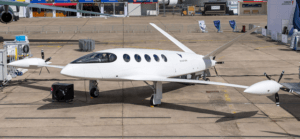Cape Air, a trailblazer in regional air travel with its headquarters at Cape Cod Gateway Airport in Hyannis, Massachusetts, is taking significant strides toward integrating electric vehicles (EVs) and clean energy solutions into its operations, now extending EV efforts to Maine, New York, Vermont, Illinois, Michigan, Montana, and Puerto Rico.
Last year our 2023 participant, Cape Air, made important additions to its vehicle fleet by incorporating EVs, showing a strong commitment to clean transportation. This strategic move not only enhanced its operational efficiency but also set a precedent for environmental stewardship within the aviation sector.
Cape Air’s dedication to electrification and sustainability didn’t stop at expanding its EV fleet. The airline actively engaged in a variety of initiatives aimed at promoting EVs, optimizing the grid, and educating its workforce on the benefits and operations of EVs.
Highlights from 2023 include:
-
EV Test Drives & Showcases: By organizing and participating in EV test drives and showcases, Cape Air played a pivotal role in raising awareness about EVs, showcasing the latest EV models, and demonstrating their capabilities and benefits.
-
Workforce Development & Training Programs: Understanding the importance of skilled personnel in the transition to clean energy, Cape Air invested in workforce development and training programs, equipping its employees with the knowledge and skills needed to navigate the EV industry.
-
Microgrid Project: Perhaps the most ambitious of its initiatives was the collaboration with the Massachusetts Department of Transportation (MassDOT) and Gateway Airport on a $2 million planning grant aimed at transforming the airport into a microgrid. This project will integrate solar generation, battery storage, and extensive charging infrastructure for public use, airport employees, regional transit authority buses, and even the aviation sector, including the first generation of electric aircraft.

Looking ahead, Cape Air is committed to not only continuing its involvement in the microgrid planning process with Gateway Airport and MassDOT but also toenhancing its incentives for employees. The airline hopes to increase its $1,000 rebate for employees purchasing new or used EVs and to boost its employee solar photovoltaic (PV) incentive, further encouraging the adoption of clean energy solutions.
Additionally, Cape Air is at the forefront of E-Plane development, collaborating with several potential developers and manufacturers to pioneer electric aircraft technology. In partnership with Cape Light Compact and Provincetown airport, the airline is also working to replace traditional gas heating systems with air heat pumps at the terminal, underscoring its commitment to reducing carbon emissions and fostering a more sustainable future.
Cape Air’s multifaceted approach to embracing clean energy, electrification, and sustainability within its operations exemplifies the potential for innovation and environmental responsibility in the aviation industry. Through its pioneering efforts in EV adoption, workforce education, and infrastructure development, Cape Air is not just navigating the future of air travel; it’s leading the way toward a cleaner, more sustainable world. Join Cape Air on its electrifying journey as it continues to set new standards for sustainability and innovation in the skies and beyond.
Learn more about their efforts in electric aviation by visiting their Sustainability site.

